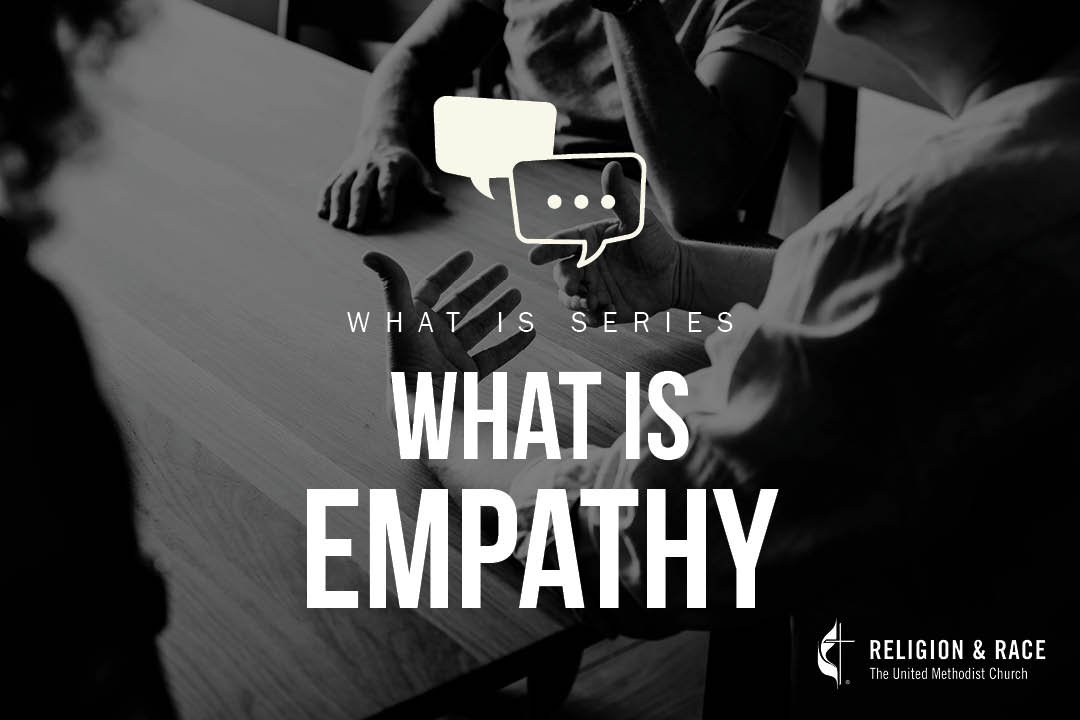What Is Empathy?
As humanity’s understanding and discussion of the concepts of race, racism, and antiracism have evolved over generations, so have the words and phrases we use as we continue the work of obeying God and advancing racial justice.
In this “What Is?” series, the General Commission on Religion and Race offers this compilation of concise definitions, examples, and Biblical/theological foundations to create common vocabulary for Christians as we engage in anti-racism work.
Our hope, as you engage this series, is that the learning equips you to move into deeper waters in anti-racism work in your respective context.
Visit the series homepage for more information on other anti-racism resources.
Definition:
“Empathy is defined as the skill allowing us to connect with people on an emotional level. Empathy requires us to invest our heart into their lives and to reassure them they are not alone.” Sympathy is defined as “feelings of pity and sorrow for someone else’s misfortune.” (Oxford Languages, 2022)
Example(s) of Empathy (vs. Sympathy):
An example of sympathy is Mark shared with his Bible study friend that their 7-year-old daughter struggles to learn the language and has few friends. One church member expressed feeling sorry that his daughter is struggling and that “children can be cruel.”
Another Bible study classmate remarked that he cannot know what it is like to immigrate to the U.S. but reflected on the experience of hopelessness when unable to protect his children and spent time helping Mark problem solve the dilemma and ways the Church might partner with the school to support immigrating youth and families.
Biblical/Spiritual/Theological Framing or References:
The Apostle Peter counseled Christians to “have compassion for one another; love as brothers, be tenderhearted, be courteous.” We see many examples of Jesus’ ministry where he had compassion: the woman with the issue of blood (Mark 5:25-34 KJV). Despite Jesus being a man and not having the lived experience of what it felt as a man personally to hemorrhage for 12 years, he had great compassion for this woman and his empathic response was one of action—he healed her instantly. Empathy is more than a feeling like often expressed in sympathy - empathy is action! Often when we encounter experiences that are different than our own, we judge and may respond with judgment instead of compassion and action. West et al., (2018)* writes that Marcus Aurelius stated, “Whenever we are about to find fault in someone, ask ourselves the following question: What fault of mine most nearly resembles the one I am about to criticize?” This self-reflection can move us to empathize (and take action) as we can remember many times when we fall short and yet God still loves us; Jesus continues to walk by our sides to guide, support, and comfort us; and that the Holy Spirit provides intercession when we struggle and wonder “How can I get through this crisis, this challenge, this life?”
*Emotional Intelligence for Religious Leaders (2018) by John Lee West, Roy M. Oswald, & Nadyne, Guzman. NY: Rowman & Littlefield (An Alban Institute Book)
Reflection Questions:
Think of a time when you encountered hardship, misunderstanding, pain. How was this experience for you individually? Were there responses from others you encountered that were non-supportive? Which responses were supportive? In the supportive encounters, did you experience an empathic response where you really felt listened to and did this response help you resolve the challenge psychologically, spiritually, and in other ways?
Think of times when someone shared their “heart” and/or pain. Can you take time to be present and discover what the person needs as support?
Do you tend to provide biblical “prescriptions” to persons instead of “hearing their hearts/minds/experiences” and explore meaningful ways to provide empathic action even when you lack understanding of this lived experience?
Are you a good listener? When you listen, are you thinking about how you will respond? Do you really listen and convey through reflecting back to the speaker what they are sharing? Do you need more skills in empathic listening? Empathic responding?
Additional Resources:
Emotional Intelligence for Religious Leaders by John L. West, Roy M. Oswald, & Nadyne Guzman (2018).
The Art of Empathy: A Complete Guide to Life's Most Essential Skill by Karla McLaren, 2013

